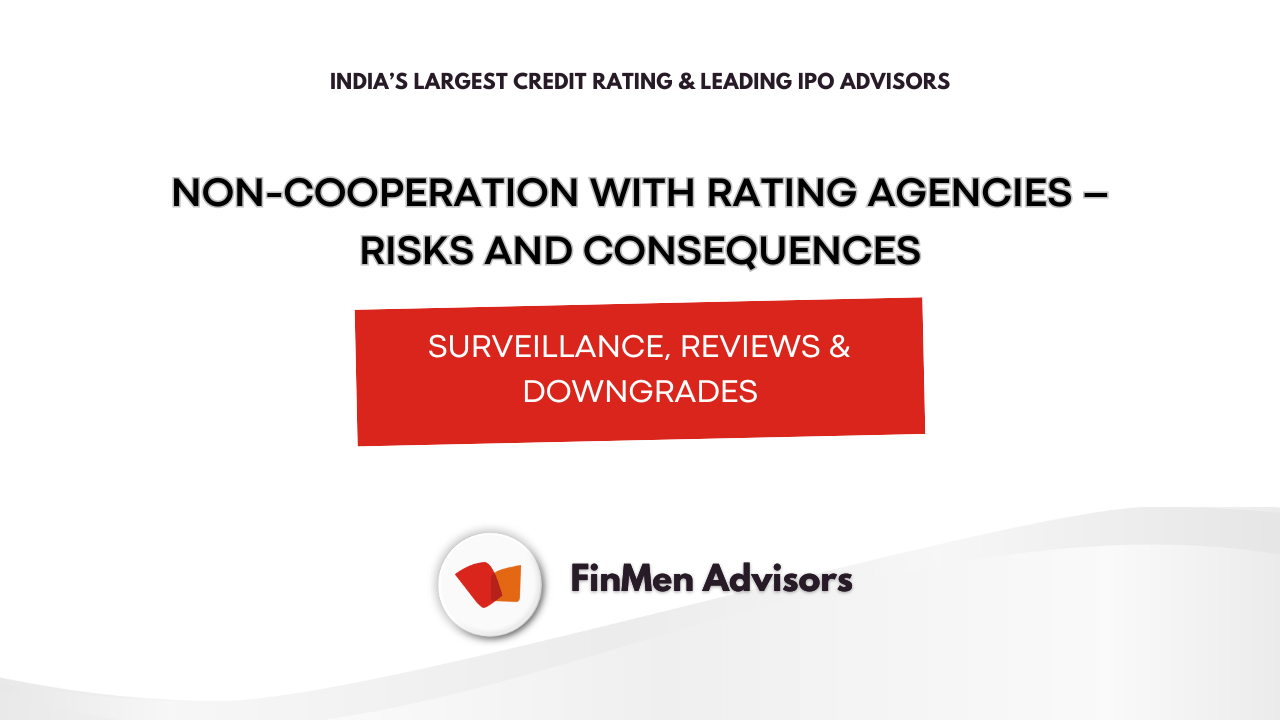In India’s financial ecosystem, credit ratings are more than just numbers — they are a mirror of a company’s credibility, governance standards, and ability to meet its financial obligations. Lenders, investors, regulators, and even business partners rely on these ratings to assess risk before engaging with a company.
For ratings to remain accurate, agencies require complete, timely, and transparent information from the companies they evaluate. However, in recent years, an increasing number of companies have been flagged as “Issuer Not Cooperating (INC)” by rating agencies. This status is assigned when a company fails to share data, avoids meetings, or withholds critical disclosures.
While some promoters and CFOs may assume that withholding information can help them avoid scrutiny, the reality is quite the opposite: non-cooperation carries significant risks and long-term consequences.
What Does Non-Cooperation Mean?
A company is treated as “non-cooperative” when:
- It does not submit audited or provisional financial statements on time.
- It ignores or delays responses to repeated requests from analysts.
- It avoids management discussions, plant visits, or operational reviews.
- It refuses to provide forward-looking information like business plans, cash flow forecasts, or debt repayment schedules.
- It selectively shares information, creating gaps in the analysis.
In such situations, rating agencies are forced to rely on publicly available information (e.g., regulatory filings, news reports), which may not capture the company’s actual financial health. This usually results in a downgrade or suspension of the rating.
Risks and Consequences of Non-Cooperation
1. Immediate Rating Downgrade or Suspension
When data is incomplete, agencies often downgrade the company’s rating or tag it as Issuer Not Cooperating. In severe cases, the rating may even be withdrawn. A single downgrade can have a ripple effect across banking relationships, investor trust, and vendor contracts.
2. Loss of Investor and Lender Confidence
Capital markets thrive on trust and transparency. Non-cooperation signals potential governance lapses and raises red flags for both institutional and retail investors. Banks may tighten credit terms, reduce exposure, or deny new funding requests.
3. Higher Cost of Borrowing
When a company is marked as INC, it is automatically perceived as high-risk. Lenders either increase interest rates to compensate for the perceived risk or impose stricter covenants. For growing businesses, this means higher financing costs and reduced competitiveness.
4. Regulatory and Compliance Setbacks
Regulatory bodies such as SEBI and RBI keep a close watch on ratings and any instances of non-cooperation. A downgraded or withdrawn rating may invite scrutiny, delay approval processes, or affect compliance standing.
5. Reputation Damage in the Market
A public downgrade due to non-cooperation is a red flag that competitors, suppliers, customers, and potential partners notice. It creates doubts about the company’s governance standards, long-term viability, and financial discipline.
6. Restricted Access to Capital Markets
Equity investors, NBFCs, banks, and bond markets rely heavily on ratings. Companies with INC tags may find it difficult to raise new funds, refinance debt, or attract equity partners. In extreme cases, non-cooperation can stall growth plans or even threaten business continuity.
Why Companies Must Avoid Non-Cooperation
- Fair and Accurate Ratings: Sharing complete information ensures ratings truly reflect the company’s strengths, rather than conservative assumptions.
- Investor Confidence: Transparent engagement with agencies builds trust among investors and lenders.
- Better Financing Terms: Strong ratings supported by credible data allow companies to negotiate better interest rates and access long-term funding.
- Reputation Protection: A cooperative stance highlights robust governance, professionalism, and financial discipline.
Best Practices for Companies
- Maintain Transparent Communication – Regularly engage with rating analysts and provide timely clarifications.
- Prepare Documentation in Advance – Keep audited financials, management notes, and operational updates readily available.
- Conduct Internal Rating Reviews – Proactively assess how your company would fare in a credit rating exercise.
- Engage Experts – Credit rating advisors can help structure information, highlight strengths, and ensure smooth coordination with rating agencies.
Conclusion
Non-cooperation with rating agencies is not just a compliance gap—it is a strategic misstep. Companies that fail to provide adequate information risk downgrades, loss of credibility, and higher financing costs. In today’s competitive landscape, where investors demand transparency and regulators insist on accountability, non-cooperation can severely weaken a company’s financial standing.
As India’s largest Credit Rating Advisory and leading IPO Advisory firm, FinMen Advisors helps companies navigate the rating process with ease. By ensuring seamless cooperation with rating agencies, preparing documentation, and highlighting strengths, FinMen Advisors enables businesses to protect their market reputation and secure access to growth capital.
Transparency today is not just compliance—it’s the foundation of trust, credibility, and sustainable growth.


